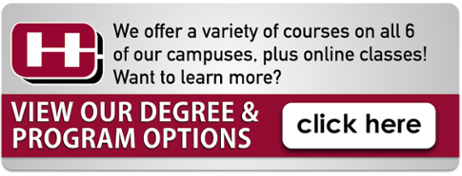Marhaba! This past semester, my family had the opportunity to travel to Palestine, spending four months engaged in research and cultural explorations. My wife was the recipient of a Fulbright Distinguished Award in Teaching, which provided funding for her to pursue a research project in the Palestinian Territories (and she was able to bring us along!).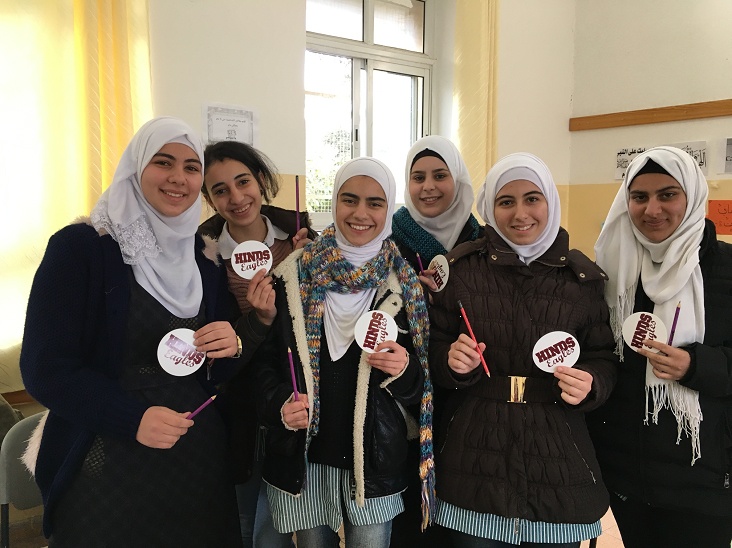
Thanks to the generous support of Hinds, I had the opportunity to teach my classes remotely, using a combination of e-learning tools, webcams and a nifty “telepresence robot.” 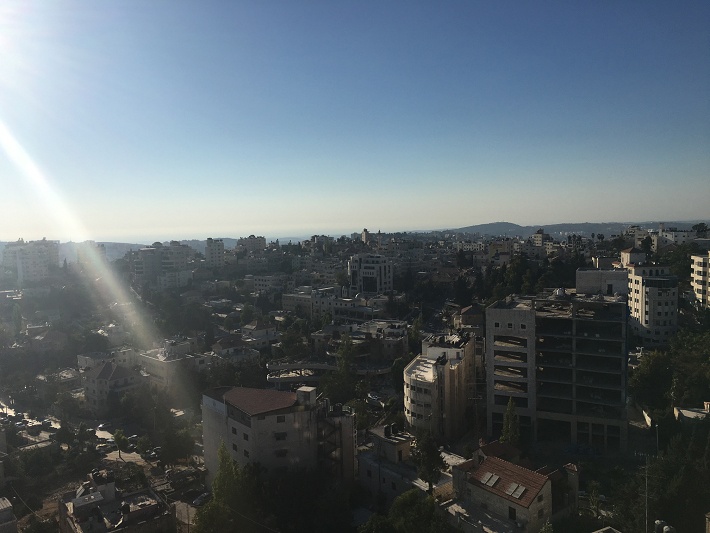
For four months, we lived in Ramallah, the de facto capital of Palestine. Lynn’s research project was an investigation of English as a Second Language writing strategies for Arabic speakers (she teaches ESL at Ridgeland and Madison Central High Schools). While she was busy meeting teachers, taking Arabic classes and visiting high schools, the kids and I settled into a normal routine where I handled most of the “home stuff” while Lynn took care of the “reason we’re there stuff.”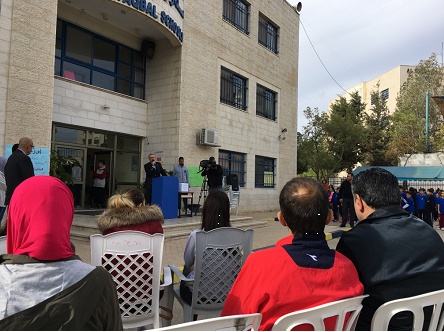
Our children (Will, 9, and Maggie, 7) attended a bilingual Arabic school two blocks away from our fourth floor apartment. Walking to school each morning was one of Maggie’s favorite parts of the experience, as she’s only seen “big city life” in movies. We couldn’t have selected a better school for the kids. Both were able to learn quite a bit of Arabic (it’s amazing how quickly children pick up on language!), while still keeping up with their studies back home.
Our first week at the school, the kids were invited to a birthday party with their classmates at Chuck-E-Cheese of all places (a great example of globalization, the restaurant captured the entire experience from the requisite guy-in-a-slightly-scary-mouse-costume to trading in 75 tickets for a 10 cent set of plastic vampire teeth).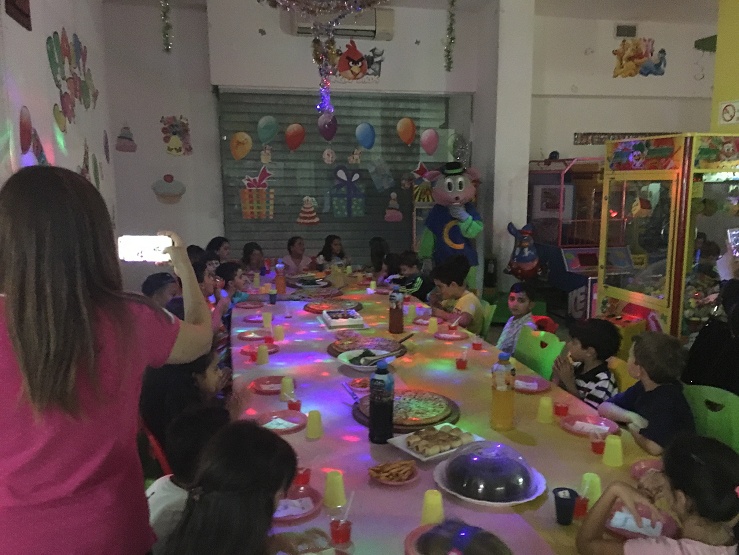
At the party, I was able to meet lots of other parents. In our conversations, we talked about how great it is for the children to have a multicultural experience and by the end of the evening, we had arranged for the kids to go to our new friends’ homes twice a week to play and practice their language (our kids helped with the English practice, and their kids helped with the Arabic).
The hospitality those families extended to us did more to show us the “real” Palestine than anything else we could have done during the trip. We enjoyed fantastic Palestinian food, were able to visit extended families on trips to their home villages, had wide-ranging conversations about family, religion, politics, and just shared life together.
One of my favorite memories of the trip was during one of those visits back to the village. We were invited to join the family for a day of olive picking in their ancestral orchards. For an entire day, four generations of the family were in the fields, picking zeitouns and dropping them onto tarps spread under the trees.
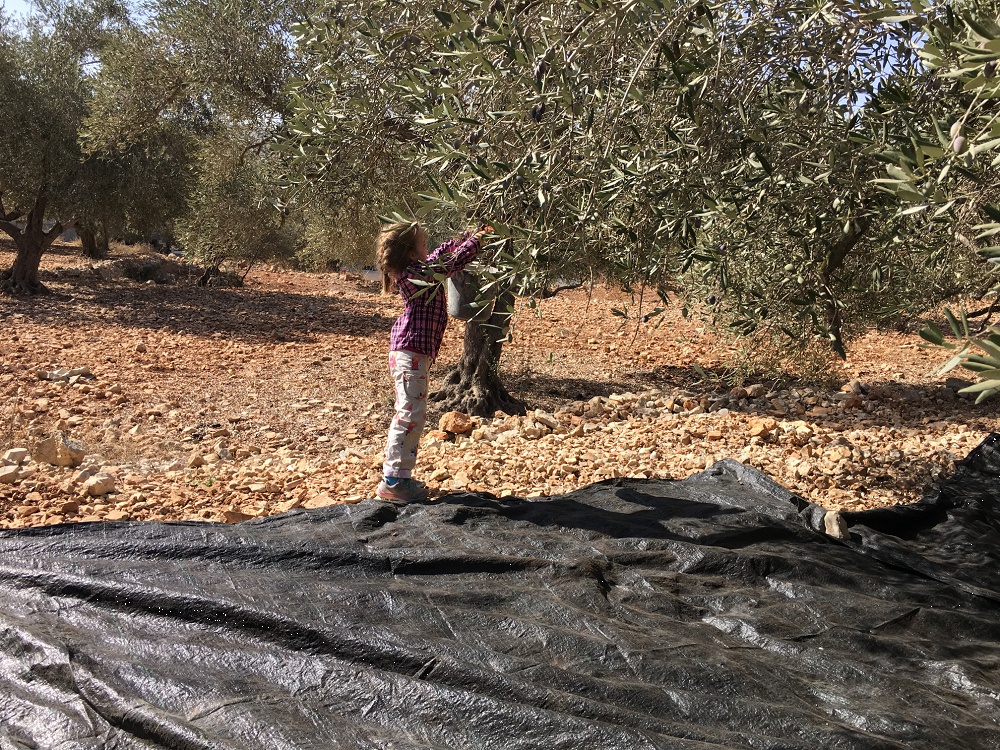
The patriarch of the family harvested the low-hanging fruit with a practiced hand, all the while keeping up a steady banter with his kids perched in the trees. He had me practicing Arabic to hilarious results when I mixed up the word for “friend” and ended up calling our elderly host my “lover.” I didn’t live that one down all afternoon!
During a lull in the conversation when we were all lost in the meditative rhythm that agricultural work can provide, I looked up to my son and his friend picking the olives at the tops of the trees. In that moment, surrounded by family who return every year for the harvest, I couldn’t help but think about why the land holds such a special connection for the Palestinian people – and why peace proposals and settlement discussions are so fraught with complexity.
Later that evening, we all gathered for a post-harvest feast with my favorite Palestinian food. Maqluba, the word for “upside down,” is a traditional meal from the Levant, made with chicken, roasted cauliflower, potatoes, and seasoned rice. As the name suggests, the pot is cooked with the chicken on the bottom, then flipped over at the dinner table onto a huge platter for everyone to enjoy (and battle for the cauliflower pieces!) with salads and yogurt.
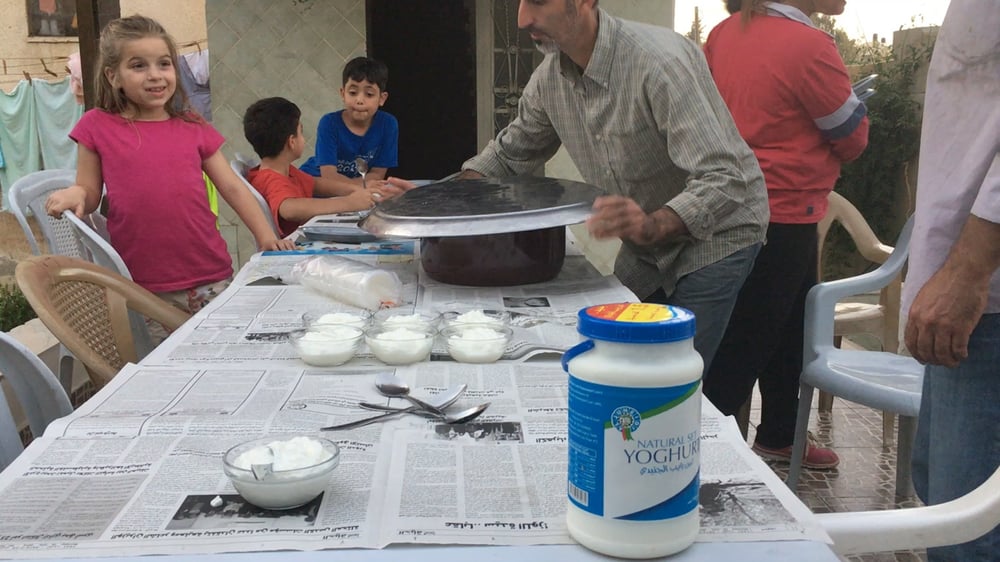
A couple of nights a week, I had the opportunity to volunteer as a visiting conversational English instructor at a language center. While English is taught in all schools in Palestine beginning in the first grade, the emphasis is usually on grammar drills rather than speaking. Since just about any job in Ramallah – even a low paying retail job – requires English skills, my students were very motivated to learn.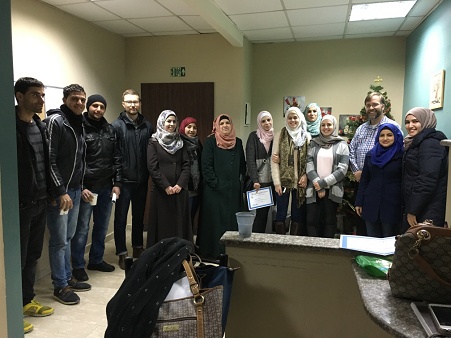
These classes allowed me to connect with students the same age as my students in Utica. In addition to learning about the challenges of their lives, the students helped me explore contemporary Arabic music, art, fashion, and coffee shop culture.
Teaching my classes back on the Utica Campus allowed me to share some of what I was learning. Rather than set up the course as a typical online class, I equipped a computer lab on campus with headsets and webcams where students came to class once each week for a “live” session, while conducting the other session asynchronously in Canvas. This hybrid approach blended the benefits of face-to-face interaction with the advantages technological tools can provide to facilitate student learning.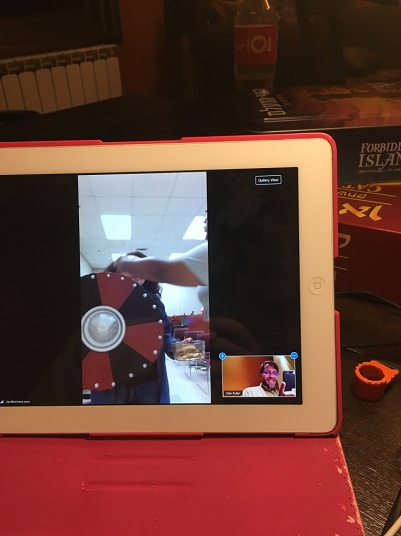
I used the Zoom conferencing platform for our live sessions and found it to work pretty well most of the time. One of my favorite features was the breakout room function.
After beginning the class with a whole group lesson and discussion, I asked students to enter virtual conference rooms where I could chat with students about their work, answer questions and provide the individual feedback they needed to move their writing to the next level.
I also connected with the class with a Kubi telepresence robot. This nifty gadget allows you to remotely rotate, pan and tilt an iPad connected to a video chat session.
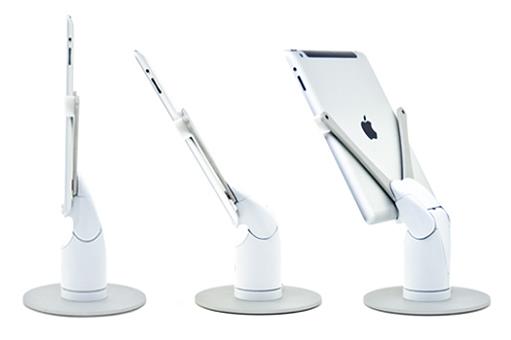
With the Kubi placed near the door, I could greet students as they entered the classroom. Students were also able to come to the Kubi for conferences or to ask questions – this was particularly helpful when a student was locked out of Canvas or had trouble joining the web conference. Having an ‘always-on’ connection in the classroom made troubleshooting those types of problems much easier.
Planning my courses and building everything in Canvas for the semester for my classes before I left went a long way to making this process work for my students and me. In case of an unreliable internet connection, I had several pre-recorded lessons ready to go. Those lessons were equipped with a “dead man’s switch” (my administrators weren’t too keen on this name though!) which would automatically publish the lesson if I didn’t login to Canvas within five minutes of our start time to turn off the scheduled post. Thankfully, I didn’t have to use any of these pre-recorded lessons. The internet went out fairly regularly in our building, but never during our scheduled classes (I did have a power outage one day during class, but the students already had their assignment). There were times when my connection was painfully slow, but Zoom handled that elegantly, prioritizing the audio portion of the conference, even if the video was a bit laggy.
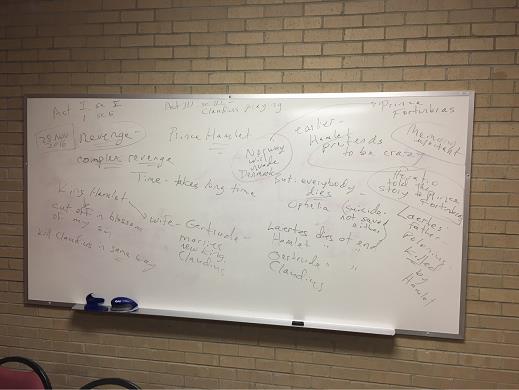 Several of my friends and mentors in the English department at Mississippi College offered their help when they learned of the trip. Four professors – Jim Everett, Kerri Jordan, Kristi Melancon and David Miller – each delivered a guest lecture at various points in the semester, exposing the students to outstanding scholarship, as well as providing them with a break from the webcam! This collaboration was the most popular aspect of the course for the students – and points to the strong relationship between our two institutions (on our campus in particular, MC has provided generous support for the NEH Holtzclaw research project, offering our upcoming Summer Institute participants 3 hours of graduate tuition at no cost).
Several of my friends and mentors in the English department at Mississippi College offered their help when they learned of the trip. Four professors – Jim Everett, Kerri Jordan, Kristi Melancon and David Miller – each delivered a guest lecture at various points in the semester, exposing the students to outstanding scholarship, as well as providing them with a break from the webcam! This collaboration was the most popular aspect of the course for the students – and points to the strong relationship between our two institutions (on our campus in particular, MC has provided generous support for the NEH Holtzclaw research project, offering our upcoming Summer Institute participants 3 hours of graduate tuition at no cost).
Of course, the classes wouldn’t have been successful without the support of my students. I’m so thankful for their willingness to experiment with the mode of course delivery. In the end, I think the experience was helpful for the students. For most, this was their first experience with an online class. I am hopeful that the learning strategies we discussed – and practiced – to make this class work helped prepare them for future online courses. Additionally, learning how to productively participate in a web conference is an important workplace skill that students developed. 
Now that I’m back on campus, I plan to continue using this technology in my face-to-face sessions. The Kubi is now placed into our discussion circles as a member of the group to record our conversations so students can review them later. The next time I have students out on medical leave, they’ll connect to the Kubi to participate with their writing groups in real time. I’ve also added on-demand Zoom conference rooms for my students to use in group projects, making it easier for commuter students to hold meetings.
I’d like to thank my Hinds family for their support. Utica Campus Vice President Dr. Debra Mays-Jackson, along with President Dr. Clyde Muse and Raymond Campus Vice President Dr. Theresa Hamilton, who is in charge of academics, gave their blessing for this experiment in remotely teaching the courses, making this trip possible for me. The flexibility that Hinds offers faculty when pitching ideas is one of this institution’s greatest strengths. Dr. Mitchell Shears on the Utica Campus was supportive from the beginning and it was actually his work in bringing a Fulbright speaker to our campus that set the wheels of this adventure in motion. Dr. Marquise Loving, in her first semester as academic dean on our campus, inherited this crazy guy going to Palestine and embraced the project. Kathryn Cole and Tara Johnson provided some great Hinds swag to pass out to students in Palestine (recruiting the class of 2020!). Latoya Allen in Student Support Services helped students in the lab and faithfully setup the Kubi each morning for me. Jean Greene, our director of Library Services, coordinated the guest faculty visits and provided tons of logistical help (Jean was also a regular commenter on our FullerNotes blog – my kids loved reading her replies to their blog posts!).
Whew! Is this where I mention the Corporation for Public Broadcasting and viewers like you? Seriously, thanks to everybody at Utica for the encouraging words, prayers, and general interest in our travels!
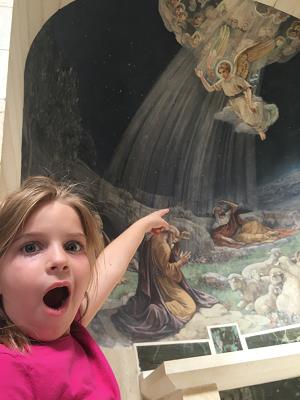
I’ll end with an endorsement of the Fulbright program for my fellow faculty members here at Hinds.
Fulbright offers many programs to places all around the world. The experience can be richly rewarding and life-changing; it certainly was for my family!


